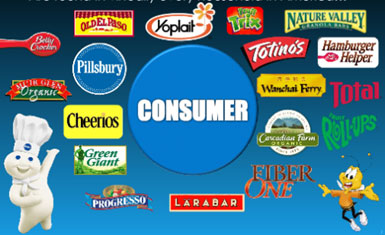Pushed hard by Oxfam America’s "Behind the Brands" campaign, food giant General Mills announced industry-leading initiatives on climate change.
Oxfam has been pressuring the food industry to make much more serious commitments on climate change, gathering over 230,000 signatures on petitions for General Mills alone.
Along with Kellogg, the two companies are at the bottom of the big 10 food corporations on addressing the problem.
As a result, Cheerios, Betty Crocker, Haagen-Dazs, Green Giant and other well-known General Mills brands will publicly advocate for action and clean up their operations and supply chains.

The company says it will sustainably source 100% of its 10 priority ingredients by 2020 – half its raw material purchases. And it’s committing to long-term science-based targets – those that keep global temperature rise below 2°C. Importantly these targets include a clear commitment to address its supply chain, which generates 92% of its emissions from agricultural ingredients and packaging.
Palm oil and pulp and paper industries are the leading cause of deforestation, accounting for almost 85% of Indonesia’s carbon emissions – the third highest in the world. 2.5 million acres a year are clear cut, releasing more carbon than all the cars, trucks, planes and ships in the US combined.
Supply chain targets will also include direct emissions (such as dairy farms), water use, waste, packaging and transportation.
To advocate for strong policy, General Mills signed the Climate Declaration and joined Business for Innovative Climate and Energy Policy (BICEP) which is working to pass meaningful climate and energy legislation.
"This would not have happened without the remarkable outpouring of public action from individuals who are fed up with the lack of effort to address climate change from too many food companies and governments," says Monique van Zijl, who manages Oxfam’s Behind the Brands campaign.
General Mills says it lost 62 days of production in the first quarter alone from extreme weather. "Too many of today’s food and beverage giants are crossing their fingers and hoping that climate change won’t disrupt the food system imagining somebody else will fix it. The "Big 10" companies generate over $1 billion a day and have great power to influence global food chains, says Winnie Byanyima, Executive Director of Oxfam.
General Mills says it will:
1. Set and disclose emission-reduction targets for its total supply chain by August 2015, with a focus on agriculture.
2. Aim for net-zero deforestation in high-risk supply chains – palm oil, packaging fiber, beef, soy, sugarcane – by 2020.
3. Disclose top three suppliers of palm oil and sugar cane.
4. Participate in the Carbon Disclosure Project, including annual reports on supply chain emissions data and forest health.
5. Publicly advocate for effective public and industry policy, such as encouraging peers to join the Consumer Goods Forum’s net-zero deforestation commitment.
6. Join BICEP and sign the Climate Declaration.
7. Regularly review company statements and policies to ensure alignment with mitigation targets and initiatives.
Kellogg is next on Oxfam’s list, so far refusing to take serious action. "We applaud General Mills for taking this vital first step," says van Zijl. "We look forward to tracking the actions the company takes to follow through on their promises. The ball is now in Kellogg’s court to respond to the hundreds of thousands of people calling for climate action."
Although GMO agriculture isn’t included in Oxfam’s campaign, almost all the top 10 food companies are behind the misinformation campaign to stop food labels.
Read our article, Big 10 Food Companies Must Do More on Climate Change, Says Oxfam.
Here is General Mill’s Climate Policy:
